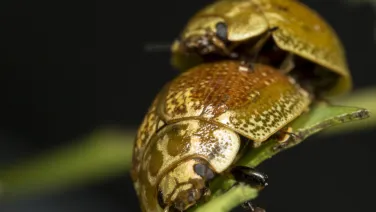
Head Group – Ecology and evolution of sex
Research in the Head Group focuses on the evolution, ecology and physiology of sexual reproduction.
Research themes
About
Research in the Head Group focuses on the evolution, ecology and physiology of sexual reproduction. Specifically, we are interested in how the environment (social and physical) influences the ecology and evolution of reproductive traits and how interactions between the environment and reproductive traits can generate biodiversity and lead to speciation. Within this focus our research also addresses questions regarding coevolution both within species (i.e. between males and females) and between species (i.e. Hosts and sexually transmitted infections).
Our research incorporates a wide variety of methods (molecular techniques, quantitative genetics, physiological performance measures, experimental manipulations and field observations) to address these research topics from different angles. I have also worked on many study systems (e.g. lizards, fish, insects), always chosen to best address the questions at hand.
Awards
Publications
Selected publications
- Campbell, L.J., Head, M.L., Wilfert, L. Griffiths, A.G.F. (2017) An Ecological role for assortative mating under infection? Conservation Genetics, 1-12.
- Vega-Trejo, R., Head, M.L., Keogh, J.S. & Jennions M.D. (2017) Experimental evidence for sexual selection against inbred males. Journal of Animal Ecology. 86 (2) 394-404.
- Head, M.L., Fox, R.J. & Barber I (2017) Environmental change mediates mate choice for an extended phenotype, but not for mate quality. Evolution, 71 (1), 135-144.
- Iglesias-Carrasco, M., Head, M.L. & Cabido, C. (2016) Habitat dependent effects of experimental immune challenge on lizard anti-predator responses. Behavioral Ecology and Sociobiology 70 (11), 1931-1939
- Vega-Trejo, R. Jennions, M.D. & Head, M.L. (2016) Are sexually selected traits affected by a poor environment early in life? BMC Evolutionary Biology 16 (1), 263
- Head, M.L., Jennions, M.D. & Zajitschek, S.R.K. (2016) Sexual selection: incorporating nongenetic inheritance. Current Opinion in Behavioral Sciences, 12, 129-137.
- Smith, S., Fox, R., Donelson, J.M., Head, M.L. & Booth, D.J. (2016) Predicting range-shift success potential for tropical marine fishes using external morphology. Biology Letters,
- Iglesias-Carrasco, M., Head, M.L., Jennions, M.D. & Cabido, C. (2016) Condition dependent trade-offs between sexual traits, body condition and immunity: the effect of novel habitats. BMC Evolutionary Biology, 16(1):1.
- Hopwood, P.E., Head M.L. *, Jordan, E.J., Carter, M.J., Davey, E., Moore, A.J. & Royle, N.J. (2016) Selection on an antagonistic behavioural trait can drive rapid genital coevolution in the burying beetle, Nicrophorus vespilloides. Evolution, 70(6):1180-1188.
- Booksmythe, I., Head, M.L., Keogh, J.S. & Jennions, M.D. (2016) The fitness consequences of artificial selection on relative male genital size. Nature Communications, 7:11597.
- Hopwood, P.E., Mazue, G.P.F., Carter, M.J., Head, M.L., Moore, A.J. & Royle, N.J. (2016) Do female Nicrophorus vespilloides reduce direct costs by choosing males that mate less frequently? Biology Letters, 12(3):20151064.
- Vega-Trejo, R., Head, M.L. & Jennions, M.D. (2016) Inbreeding depression does not increase after exposure to a stressful environment: a test using compensatory growth. BMC Evol Biol, 16(1):1.
- Parker, D.J., Cunningham, C.B., Walling, C.A., Stamper, C.E., Head, M.L., Ro-Zokan, E.M., McKinney, E.C., Ritchie, M.G., & Moore, A.J. (2015) Transcriptomes of parents identify parenting strategies and sexual conflict in a subsocial beetle. Nature Communications, 6: 8449.
- Head, M.L., Holman, L., Lanfear, R., Kahn, A.T. & Jennions, M.D. (2015) The extent and consequences of P-hacking in science. PLoS Biology, 13(3):e1002106.
- Holman, L., Head M.L.*, Lanfear, R. & Jennions, M.D. (2015) Evidence of experimental bias in the life sciences: why we need blind data recording. PLoS Biology, 13(7):e1002190
- Carter, M., Head, M.L., Moore, A.J. & Royle, N.J. (2015) Behavioural plasticity and GxE of reproductive tactics in Nicrophorus vespilloides burying beetles. Evolution, 64(4:)969-978
- Head, M.L., Jacomb, F. Vega-Trejo, R & Jennions, M.D. (2015) Male mate choice and insemination success under simultaneous versus sequential choice conditions. Animal Behaviour, 103:99-105.
- Head, M.L., Vega-Trejo, R., Jacomb, F. & Jennions, M.D. (2015) Predictors of male insemination success in the mosquitofish (Gambusia holbrooki). Ecology and Evolution, 5: 4999-5006.
- O’Dea, R.E., Vega-Trejo, R., Head, M.L. & Jennions, M.D. (2015) Maternal effects on offspring size and number in mosquitofish, Gambusia holbrooki. Ecology and Evolution, 5:2945-2955
- Vega-Trejo, R., Head, M.L. & Jennions, M.D. (2015) Evidence for inbreeding in a species with limited opportunity for maternal effects. Ecology and Evolution, 5(7):1398-1404.
- Head, M.L., Hinde, C., Moore, A.J. & Royle, N.J. (2014) Correlated Evolution in Parental Care in Females but not males in response to selection on paternity assurance behaviour. Ecology letters, 17: 803-810.
- O’Dea, R.E, Jennions, M.D. & Head, M.L. (2014) Male body size and condition affects sperm number and production rates in mosquitofish, Gambusia holbrooki. Journal of Evolutionary Biology, 27(12):2739-2744.
- Vega-Trejo, R., O’Dea, R.E., Jennions, M.D. & Head, M.L. (2014) The effects of familiarity and mating experience on mate choice in mosquitofish, Gambusia holbrooki. Behavioural Ecology, 25(5):1205-1211
- Seear, P.J., Head, M.L. *, Tilley, C.A., Rosato, E. & Barber, I. (2014) Flow-mediated plasticity in the expression of stickleback nesting glue genes. Ecology and Evolution, 4(8): 1233-1242
- Lindhom, A.K., Head, M.L., Rollins, L.A., Brooks R.C. & Zajitschek S. (2014) Causes of male sexual trait divergence in introduced populations of guppies. Journal of Evolutionary Biology, 27(2): 437-448.
- Benowitz, K.M., Head, M.L. *, Moore, A.J. & Royle, N.J. (2013) Male age mediates reproductive investment and response to paternity assurance. Proceedings of the Royal Society of London, Series B, 280: 20131124.
- Lee, V.E., Head, M.L., Carter, M.J. & Royle, N.J. (2013) Effects of age and experience on contest behaviour in the burying beetle, Nicrophorus vespilloides. Behavioural Ecology, 25(1): 172-179.
- Tinghitella, R.M., Weigel, E.G., Head, M.L. & Boughman, J.W. (2013) Flexible mate choice when mates are rare and time is short. Ecology and Evolution, 3: 2820-2831.
- Head, M.L., Kozak, G.M. & Boughman, J.W. (2013) Female mate preferences for male body size and shape promote sexual isolation in threespine sticklebacks. Ecology and Evolution, 3: 2183-2196.
- Kozak, G.M., Head, M.L., Lackey, A.C.R. & Boughman, J.W. (2013) Sequential mate choice and sexual isolation in threespine stickleback species. Journal of Evolutionary Biology. 26: 130-140.
- Head, M.L., Berry, L.K., Royle, N.J. & Moore, A.J. (2012) Paternal care: Direct and indirect genetic effects on offspring performance. Evolution, 66(11): 3570-3581.
- Kozak, G.M., Head, M.L. & Boughman, J.W. (2011) Sexual imprinting leads to reproductive isolation in the threespine stickleback. Proceeding of the Royal Society, Series B. 278(1718):2604-2610.
- Head, M.L. Wong, B.B.M. & Brooks (2010) Sexual display and mate choice in an energetically costly environment. PLoS one. 5(12):e15279.
- Rushbrook, B., Head, M.L. & Barber, I. (2010) Flow regime affects nest building behaviour and nest composition in the threespine stickleback. Behavioral Ecology and Sociobiology. 64(12): 1927-1935.
- Head, M.L., Price E.A. & Boughman, J.W. (2009) Body size differences do not arise from divergent mate preferences in a species pair of threespine stickleback. Biology Letters. 5(4): 517-520.
Cockburn, A., Dalziell, A.H., Blackmore, C.J., Double, M.C., Kokko, H., Osmond, H.L., Beck, N.R., Head, M.L. & Wells, K. (2009) Superb fairy-wren males aggregate into hidden leks to solicit extragroup fertilizations before dawn. Behavioral Ecology. 20(3): 501-510.
Head, M.L., Lindholm, A. & Brooks (2008) Operational sex ratio and density do not affect directional selection on male sexual ornaments and behaviour. Evolution. 62(1):135-144.
- Head, M.L., Doughty, P., Blomberg, S.P. & Keogh, J.S. (2008) Chemical mediation of reciprocal mother-offspring recognition in the Southern Water Skink (Eulamprus heatwolei). Austral Ecology. 33:20-28.
- Bonduriansky, R. Head, M. (2007) Maternal and Paternal condition effects on offspring phenotype in Telostylinus angusticollis (Diptera: Neriidae). Journal of Evolutionary Biology. 20(6):2379-2388.
- Head, M.L., Hunt, J. & Brooks (2006) A genetic association between male attractiveness and female differential allocation. Biology Letters. 2(3):341-344.
- Head, M.L. & Brooks, R. (2006) Sexual coercion and the opportunity for sexual selection in guppies. Animal Behaviour. 71(3): 515-522.
- Head, M.L., Doughty, P. & Keogh, J.S. (2005).Male southern water skinks (Eulamprus heatwolei) use both visual and chemical cues to detect female sexual receptivity. Acta Ethologica. 8(2): 79-85.
- Head, M.L., Hunt, J. Jennions, M.D. & Brooks, R. (2005) The indirect benefits of mating with attractive males outweigh the direct costs. PLoS Biology. 3(2):e33.
- (IF: 11.896, cited: 133, ranked 1st of 85 in biology)
- Doody, J.S., West, P., Stapley, J., Welsh, M., Tucker, A., Guarino, E., Pauza, M., Bishop, N., Head, M., Dennis, S., West, G., Pepper, A. and A. Jones. (2003) Fauna by-catch in pipeline trenches: conservation, animal ethics, and current practices in Australia. Australian Zoologist. 32(3): 410-419.
- Head, M.L., Doughty, P. & Keogh, J.S. (2002) Experimental evidence of an age specific shift in chemical detection of predators in a lizard. Journal of Chemical Ecology. 28(3): 541-554.






